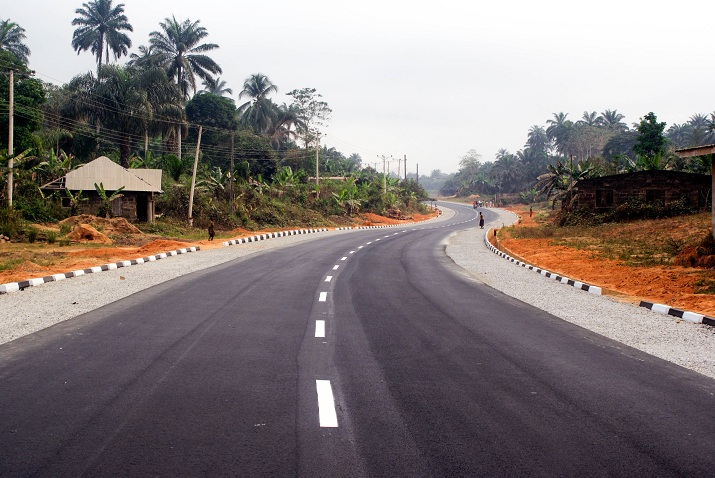|
||||||||||
| Home Nation World Business Opinion Lifestyle ChinAfrica Multimedia Columnists Documents Special Reports |
|
||||||||||
| Home Nation World Business Opinion Lifestyle ChinAfrica Multimedia Columnists Documents Special Reports |
| Business |
| Investing in the Future |
| | VOL.9 November 2017 ·2017-11-03 |

Infrastructure is important for a country's development. This road in AkwaIbom State, Nigeria, was built by a Chinese company
This year saw the Third Investing in Africa Forum (IAF) take place in Dakar, capital of Senegal on September 25-27. The annual gathering brings together the cream of the world's economic experts and the 2017 event embraced the theme "Leapfrogging Through Innovation." Focusing on ramping up the level of innovation in Africa's economic sectors, the forum was hosted by the Government of Senegal, Chinese Ministry of Finance, China Development Bank, and the World Bank Group. Jeremy Stevens, economist at the Standard Bank Group, spoke to ChinAfrica about the challenges and opportunities Chinese and other investors face when considering Africa as a destination and how innovation is essential to overcoming issues like high rates of urbanization, and poor infrastructure as it relates to Africa's vast youthful population
ChinAfrica: What impressed you most at this year's forum?
Jeremy Stevens: As one would expect, the event was absolutely impeccable. Also as expected, the presentations and panel discussions were on point. However, what impressed me most about this year's forum was the quality of the delegates in attendance - some of the largest and most consequential business leaders in the region were present and focused on stimulating economic growth, creating jobs and developing the African region. Reflecting this, the Standard Bank Group had a number of very positive meetings on the sideline of the forum where a host of opportunities were discussed. Simply put, the framework has been set, the partnerships are being made, and this forum is proving to be effective and successful.
What sectors do you think Africa needs investment most? Why?
While this is not an incredibly ground-breaking point to make, it still holds true that Africa has a serious infrastructure deficit - estimated to be to the tune of around $100 billion per year. Investments in power, roads, bridges, ports and so on lay the foundation for future economic growth and development.
If these needs are not met, some of Africa's productive and catch-up potential will remain locked, consumers and markets will remain small and fragmented, competitive advantages will sit dormant, and the formation of linkages to intra-Africa and international markets will be difficult to realize. To use an economic term, achieving Pareto Optimality (an economic state where resources are allocated in the most efficient manner) will be impossible.
Promisingly, African governments and economists recognize this critical starting point and are prioritizing key infrastructure projects, exploring alternative sources of financing and ways to reduce wastage in such investments. Of course, China - particularly through concessional lending from the Export-Import Bank of China and CDB, and also through commercial loans from ICBC - is playing a profound role in building African infrastructure.

Jeremy Stevens
What are the traditional bottlenecks to investments in Africa and what are any new bottlenecks which may arise in an increasingly hi-tech world?
Given that as much as $100 billion is required each year to close this infrastructure gap, the financing requirement in isolation is a challenge. African governments have to tap a wide range of policy options to open up new sources of finance. However, the real problem for companies looking to do business in Africa is a lack of local knowledge and local partnerships in Africa.
China is promoting the Belt and Road Initiative and Africa is a part of the 21st Century Maritime Silk Road. In what aspects do you think the initiative can promote Chinese investment in Africa?
More than ever before, the onus is on African projects to remain relevant. It seems reasonable to argue that any African infrastructure projects that can fit into the dynamic Belt and Road Initiative could be fast-tracked. China has committed to job creation and industrial upgrading inside Africa, but the wide geographical reach of the Belt and Road Initiative means that Africa needs to provide a more systematic, coordinated and industry-specific plan to remain at the center of China's foreign policy.
There are Chinese investments in Africa that attract both positive and negative attention. How do you evaluate their performance? What advice do you have for Chinese companies thinking of investing in Africa?
First and foremost, it can be said that Africa, in the vast proportion of cases, welcomes partnerships with China. Numerous surveys show that African perceptions of China are more favorable than elsewhere. In addition, surveys show that Africa's political leaders and businesses believe partnerships with China are likely to bring more opportunities than partnerships with others. While those are two broad and general statements, that is what the anecdotal and survey data confirm.
In terms of returns, Chinese projects in Africa also tend to yield higher returns than Chinese projects elsewhere. It is also clear that China's own domestic transformation means that more and more Chinese businesses are looking at opportunities in Africa. For some, it's about reaching capacity in the domestic economy and for others it's due to rising unit labor costs. For more still, it's about shifting production capacity closer to end markets in Africa. These trends are entrenched and will endure.
The theme for this year's forum is Leapfrogging Through Innovation. Why is innovation so important for attracting investment in Africa?
Social ingenuity is the space in which innovation is flourishing in Africa. It is absolutely critical in solving many real practical problems that people in Africa face on a day-to-day basis. It is also crucial in terms of confronting the headwinds to African economic growth and development. Simply put, the order of the day is to find necessity-based, fit-for-purpose and innovation-led solutions to practical problems.
It is no surprise that innovation is being placed front and center of forums like this one. And herein lays the challenge and opportunity. The vast majority of Africa's population is under 30; it has particularly high rates of urbanization; and it suffers from poor infrastructure. Creating the necessary responses to these critical issues requires innovation.
An obvious example of such innovation is in mobile telephony. Africa has greater mobile penetration than electricity penetration. As a result, mobile phones are being used to connect people to markets and trade, and are being used by many Africans to access healthcare, transfer money and conduct other day-to-day activities. Innovation in this case is clearly a catalyst for development.
In the same way that a person doesn't need to have first owned a radio before owning a CD player and then progressing on to an iPod, the development path of countries is also no longer linear. It is now possible to leapfrog directly to smartphones. In productive cities, innovations will unlock an entrepreneurial spirit and foster economic enterprise.
|
||
| About Us | Contact Us | Advertise with Us | Subscribe |
| Copyright Beijing Review All rights reserved 京ICP备08005356号-5 京公网安备110102005860号 |